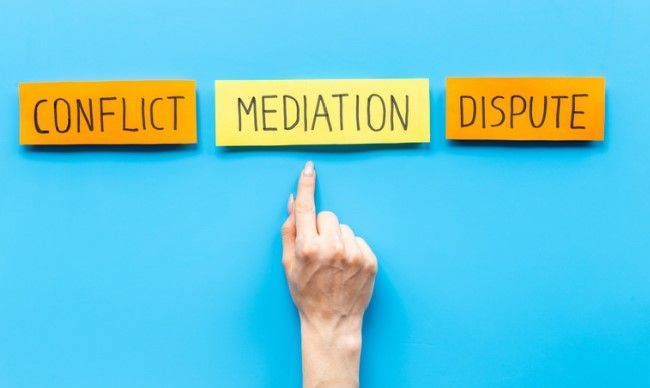Exploring the Benefits of Mediation: Tips for Successful Preparation

Many individuals prefer to steer clear of court appearances, especially when dealing with divorce. In such situations, opting for mediation can be a wise initial move. Mediation facilitates discussions between you and your spouse, aiming to reach a fair and agreeable divorce settlement for both parties.
What Makes Mediation Worth Considering?
Apart from avoiding court proceedings, mediation could be the best choice for couples with children, shared property, and investments. After choosing to divorce, the next step involves determining asset division, child custody arrangements, and support agreements. A mediator, acting as a neutral third party, assists couples in negotiating these matters prior to finalizing the divorce.
Navigating the complexities of ending a marriage can be emotionally challenging, especially when trust issues and past hurts come into play. In such circumstances, it's common to struggle to remain objective and rational. A mediator can assist both parties in reaching a point where agreements and compromises can be made. While a mediator doesn't provide legal counsel, they can facilitate more effective communication between you and your spouse. If you both aim for an amicable resolution and can interact civilly, mediation might be the suitable option. It's even possible to conduct mediation sessions over the phone if necessary.
Should You Let a Mediator Lead?
If you opt for mediation, it's important to be ready. Just like divorce court, mediation isn't something you can handle spontaneously. It involves its own set of procedures and can be just as stressful as a traditional case. Being unprepared could result in not getting the settlement you hope for.
Mediators assist you and your partner in making critical decisions that come with divorce. However, they won't dictate your choices or make decisions on your behalf. It's up to you to envision what you want your life to be like after the divorce process concludes. Concentrate on what you require from the separation to achieve that vision.
Meeting With Your Divorce Mediator
For your initial meeting with your divorce mediator, remember to gather essential documents like a list of jointly owned assets, the valuation of your home, and any prenuptial agreements you have. Also, bring copies of your income tax returns and statements for retirement accounts. It's a good idea to have a notebook and pen with you to take notes and jot down any questions you want to ask during the meeting.
Take notes on important details and discuss fees. Having a financial expert, such as a Certified Divorce Financial Analyst®, is crucial for mediation. During the initial meeting with a divorce mediator, the focus is on understanding your situation, assessing the relationship dynamic, and familiarizing yourself with the mediator.
Even though mediation typically takes place in an office or meeting room, it's intended to feel casual and relaxed. The mediator aims to foster a calm environment where both partners can communicate effectively. Their main objective is to assist the couple in finding innovative ways to reach agreements, particularly if there's tension between them. The frequency of sessions varies depending on the complexity of each divorce. While some couples may require only a few sessions, others may need more time to resolve their issues.
Mediation often reduces attorney fees and is a smart way to get ready for your divorce. Plus, avoiding court can make the process smoother for the entire family.
This information is not intended to be a substitute for seeking legal advice from an attorney. For legal or tax advice please seek the services of a qualified attorney and/or qualified tax professional.
Free 30-Minute
Divorce Strategy Session
Hurry, only 5 sessions available each month
- Discover what's important to consider when contemplating divorce!
- Discuss issues that nag at whether this is the right decision for you!
- Do something now! Your life and happiness are important! You matter!
Pathway Divorce Solutions LLC
4811 S. 76th St., Ste 400 Greenfield, WI 53220
Text/Office: (414) 533-5353
Hours: By Appointment
Site Menu
Sign Up for Updates
Join the Newsletter
We will get back to you as soon as possible
Please try again later
Disclosure
Jodie Lane is an Independent Wealth Advisor and a Certified Divorce Financial Analyst®; however, such registration does not imply a certain level of skill or training and no inference to the contrary should be made. The information presented is for informational purposes only, does not intend to make an offer or solicitation for the sale or purchase of any securities, and should not be considered investment advice. Jodie Lane has not taken into account the investment objectives, financial situation, or particular needs of any individual investor. There is a risk of loss from an investment in securities, including the risk of loss of principal. Different types of investments involve varying degrees of risk, and there can be no assurance that any specific investment will be profitable or suitable for a particular investor's financial situation or risk tolerance. Asset allocation and portfolio diversification cannot assure or guarantee better performance and cannot eliminate the risk of investment losses. Be sure to first consult with a qualified financial advisor and/or tax professional before implementing any strategy discussed here. Past performance is not indicative of future results. Investments involve risk, including loss of principal and unless otherwise stated, are not guaranteed. The information provided reflects Jodie Lane's views as of certain time periods, such views are subject to change at any point without notice.
Our Privacy Policy
Pathway Divorce Solutions provides informational articles not intended to be used as the sole basis for financial decisions, nor should it be construed as advice designed to meet the particular needs of an individual's situation. Pathway Divorce Solutions is not responsible for the consequences of any decisions or actions taken as a result of information provided in these articles and does not warrant or guarantee the accuracy or completeness of the information requested or displayed. External Links are not affiliated with Pathway Divorce Solutions.
All Rights Reserved | Pathway Divorce Solutions
